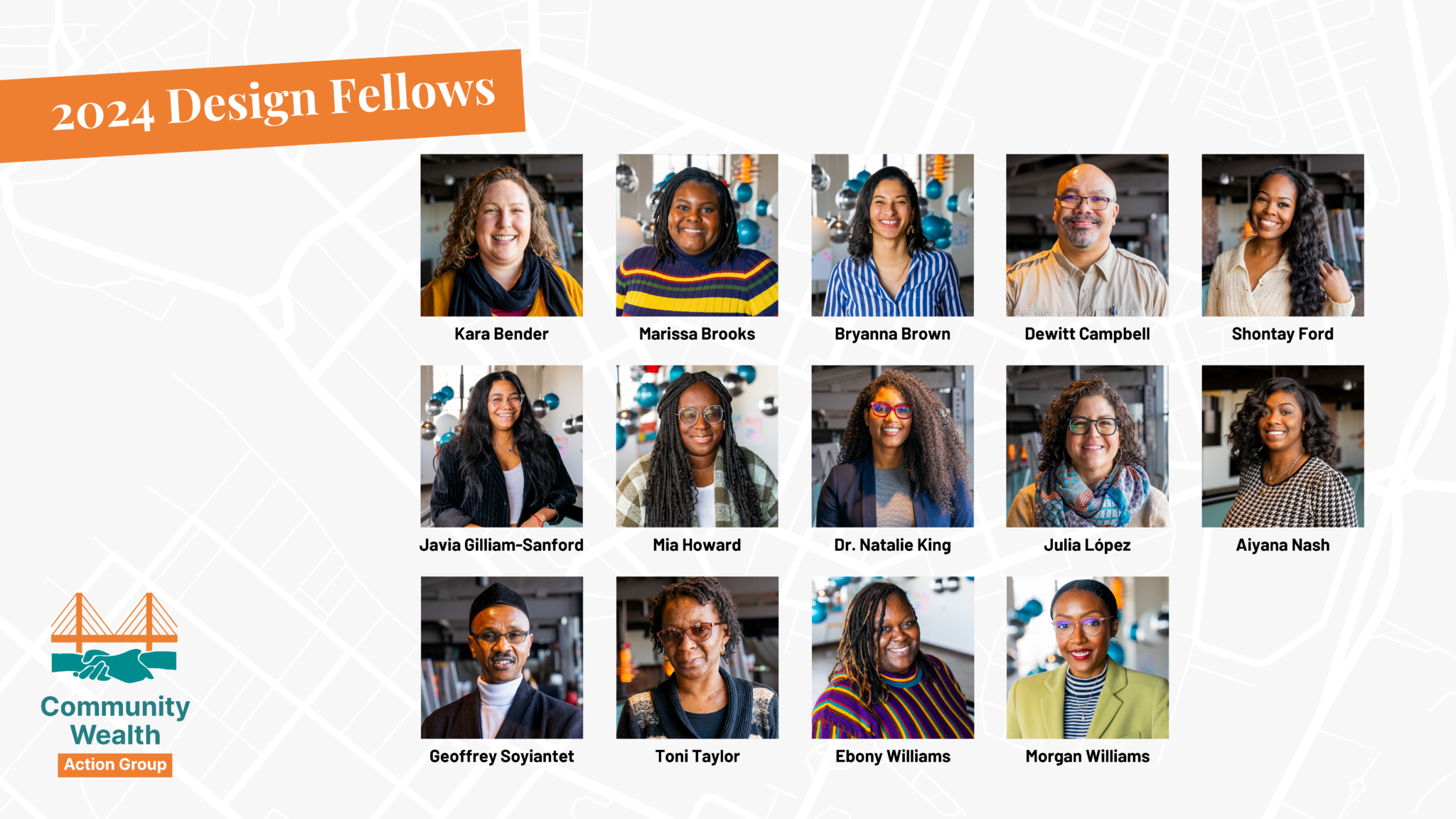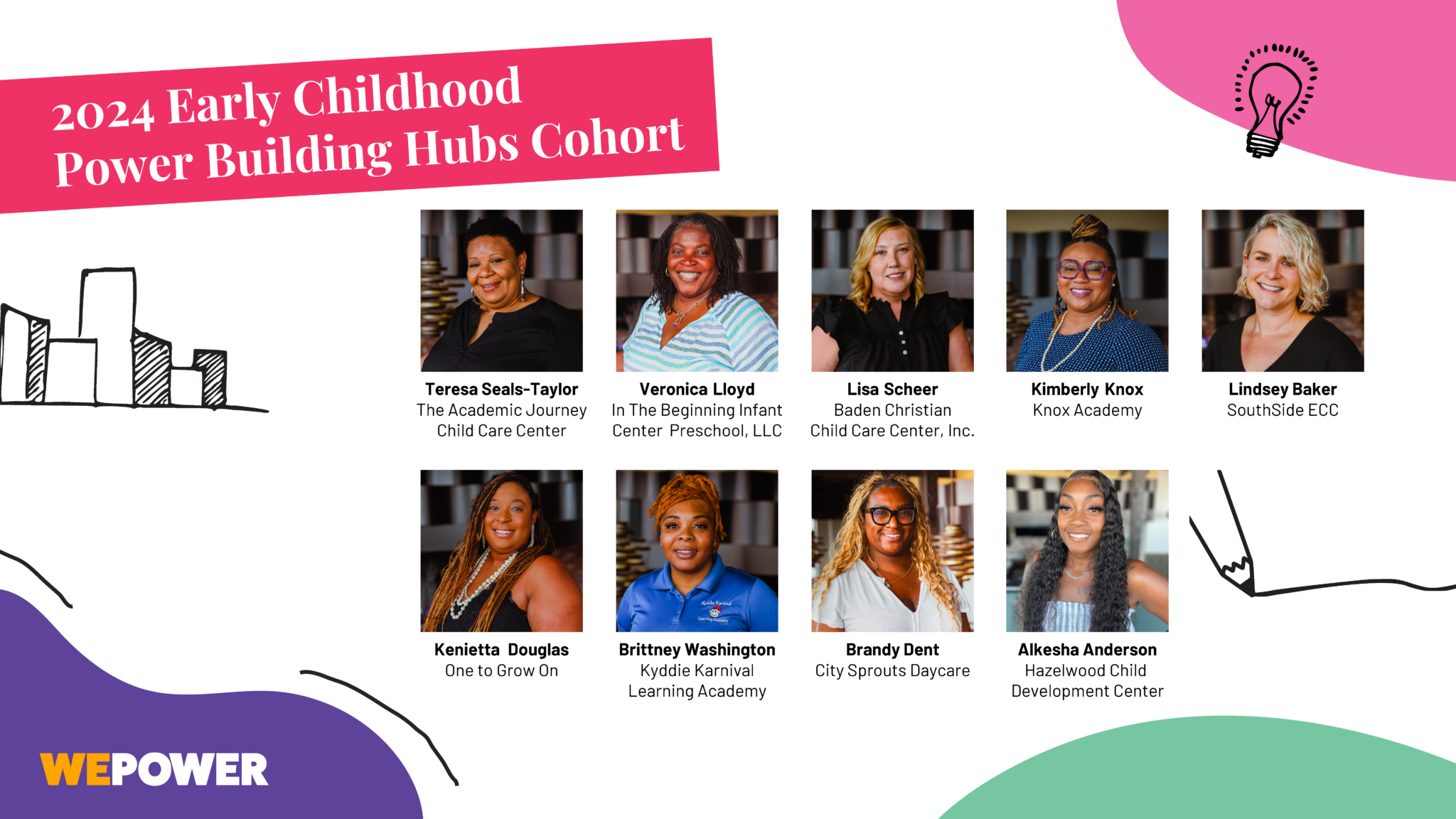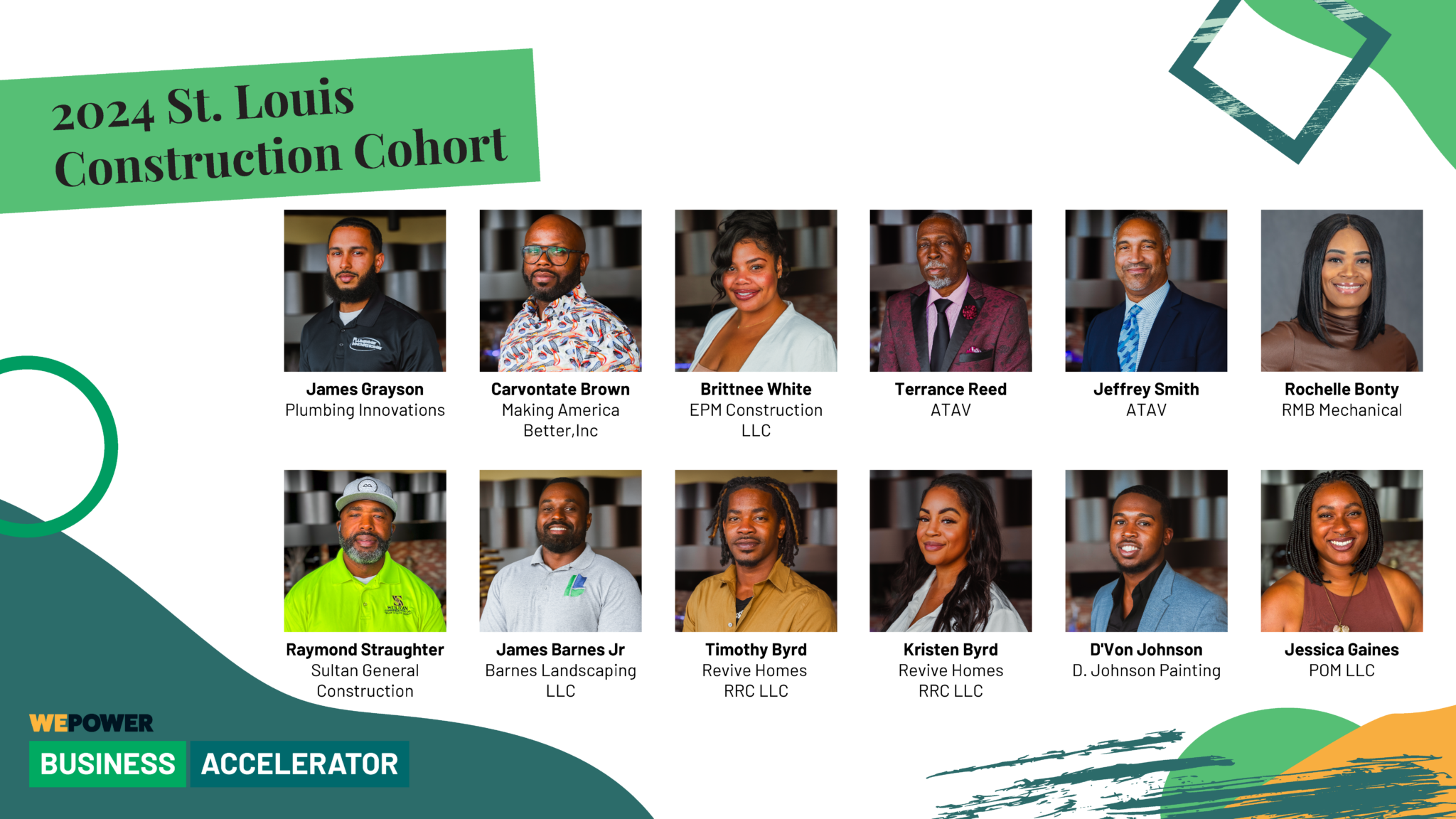The Fierce Urgency of Now | Charli’s 2024 Garden Party Remarks
August 16, 2024
The Fierce Urgency of Now
Charli's 2024 Garden Party Remarks
Good evening, it means so much to me to have so many of you here tonight celebrating our third annual Garden Party and engaging in the WEPOWER Wknd experience.
Thank you to our sponsors for tonight and this weekend: our presenting sponsors Date Ideas & Things to Do and Rio Vista Foundation, and also Ameren, Block, BioSTL, Renaissance Financial, BJC Healthcare, Commerce Bank, Cortex Innovation Community, Food Corps, and Freedom Community Center.
I especially want to thank my amazing team for making tonight possible and for working so hard every day to honor and bring WEPOWER’s mission to life. Especially thank you to Alicia Alexander, our outgoing VP of Development, the fearless and patient leader who brings WEPOWER Wknd to life. Bless you and Stacey Pugh for dealing with my crazy ideas. lol. Lastly, thank you to our board for being such courageous champions and stewards of our work.
Our liberation calls on our resilience, for us to remain accountable, as Dr. King called it, to “The Fierce Urgency of Now.” And, our freedom also calls us to remain steadfast to our boldest dreams and wildest imaginations even when the road is longer and the terrain is tougher than what we could have ever fathomed.
Some historians argue there were at least 250 uprisings and attempted uprisings among slaves before the Civil War. Yet, the multi-century duration of chattel slavery never changed that the end goal was always to be free.
In 1975, the Agricultural Labor Relations Act was passed to protect the rights of workers and labor organizations. It was fueled by more than 1,000 strikes, boycotts, and direct actions among farm workers over a decade. But, nearly 30 years before the Farm Workers Movement, 12,000 workers, mainly women, led the Pecan Shellers Strike. Resilient, urgent, and committed to the vision they were.
Brown v. the Board of Education ended racial segregation in public schools all across the United States in 1954, but more than 100 years before that, in 1849, there was Roberts v. The City of Boston. Black parents in Kansas pursued 11 different court challenges to school segregation. In California, there was Avarez v. Lemon Grove School District and Mendez v. Westminster. In Maryland, there was Murray v. Pearson. The list goes on.
Before Rosa Parks refused to get up in 1955, Claudette Colvin was arrested for doing the same, then Mary Louise Smith. Before all three of their protests, there was “A Letter from the Women’s Political Council” calling for the desegregation of seating on buses and testimony at Council meetings and hearings. (Sounds familiar I’m sure) Before the Montgomery Bus Boycott, there was the Harlem Bus Boycott in 1941 that involved the leadership of Adam Clayton Powell. It was 1956 when the U.S. Supreme Court outlawed segregated seating on public buses.
History has taught us that our movements require resiliency, a fierce urgency, and an unwavering commitment to the vision.
I was directly reminded of these truths this year.
I stood before many of you at the first Garden Party and again at the second one declaring that by December 2024, together, we would celebrate a significant win in St. Louis of generating $100 million in sustainable public funding on our journey to make childcare affordable and accessible to every child and family. This year, only a few months away from December, I stand before you knowing that 2024 won’t be the year.
The goal, however, remains the same, and the work and actions necessary to realize it remain urgent, although the road to get there is more challenging than I, and maybe you, had expected.
As some of you know, we also tried in 2020 to make significant progress towards this vision through pursuing a tax that would generate approximately $84 million per year in St. Louis County. Before that, in 2016, others pursued a statewide ballot measure to secure sustainable funding for early childhood education, which did not pass.
The crisis of childcare is one of the most significant systemic and social issues that our region, state, and country must grapple with in the 21st century. Within this failing system exist the remnants of our unpaid debt for the sins of slavery. My enslaved ancestors were some of the first caretakers of white children in this country. They cared for and loved on children who weren’t theirs with no form of payment in return.
The gross underfunding of early childhood affirms our society’s dehumanization of women, especially women of color. Our complacency with the emerging collapse of a system made up of nearly 100,000 children ages zero-five in St. Louis reveals our comfort with relying on and expecting care without the will or commitment to compensate for its receipt or ability to sustain.
There is a direct correlation between the makeup of the workforce of the childcare sector and its lack of resources and respect. Early childhood educators are overworked and underpaid and even at times unpaid. Over 90% of the childcare workforce is female and approximately 40% of them identify as women of color, mainly Black and Latina. It is criminal for the median hourly wage of a childcare educator to be $10.72 and for over 50% of them to rely on public assistance of some kind. The team hears stories weekly of women running centers sacrificing their bodies and personal resources to care for our region’s children – selling their cars, taking out second mortgages on their homes, not paying themselves, deciding which bills to pay – creatively constructing a web of assets to keep their doors open – because of their radical love of our babies. We hear stories of some centers being forced to close and it results in children being left in unsafe places, some even dying as a result. We hear the horrors of mothers having to leave their children in the car amidst the blazing heat of the summer as they work full time jobs that are still insufficient to cover the cost of care.
And so, despite the brutal critiques of WEPOWER and our partners, we are still standing and still clear on our mission. We are not wavering on our commitment to making childcare a civil right. Despite these many critiques reflected in newspapers, Tweets, tv clips, whispers, silence, and inaction. Despite some of our leaders telling us to wait for the “perfect time for action”, we will remain steadfast.
We will practice and aspire to master the “fierce urgency of now” paired with building our resiliency so that the many seeds that have been planted before us and by us can one day sprout into a day where, regardless of race, income, or ZIP code, EVERY St. Louis family can access affordable education and care for children ages 0-5, care we can trust to be joyful and high-quality.
We won’t back down or shrink as we navigate the challenges of this freedom work. We made a pledge and we will stick to it, however long it takes to build enough power to create an early childhood system that will create, for our children and communities, boundless possibilities.
We are clear that our commitment to childcare justice is also a commitment to economic justice, to true transformational public safety (backed by research), to K12 public education preparedness, but also a testament to our respect, deep love for, and accountability to the Black and Brown women who have cared for this country at the expense of their own ability to care themselves and their families.
I believe that making childcare a civil right will plough the soil for freedoms of all kinds to sprout and take root. A triple dismantling of sexism, racism, economic exploitation that has poisoned the land upon which we exist.
During his speech at The March on Washington, King said, "We have come to this hallowed spot to remind America of the fierce urgency of now. This is no time to engage in the luxury of cooling off or to take the tranquilizing drug of gradualism. Now is the time to make real the promises of democracy". ― Martin Luther King Jr.
Many of the injustices we see in our childcare system mirror injustices we see in our economy more broadly. In addition to our commitment to transforming childcare, we are also committed to transforming the economy to be one that cares for all people and cares for the land on which we live. At the core, both childcare and economic justice are about putting care and love at the center of our social systems. That’s why we spent the first half of this year engaged in a radically inclusive process of reimagining STL’s economy, collectively dedicating thousands of hours and engaging with approximately 1,000 people to declare a bold vision and set of solutions for how to create a St. Louis where all children, families, and communities are safe, wealthy, and well.
As we are gathered here tonight with the privilege of overlooking the Mississippi River, King’s words still ring true for us here in St. Louis. We sit at the waters that some argue divide us and East St. Louis, but I would argue unite us. We sit at the waters of a River that holds our ugliest truths but also some of our most liberatory victories and acts of courage.
It cannot be lost on us the significance of both the place and the time in which we are gathered.
On the other side of this river was one of the largest race massacres in our country, in East St. Louis in 1917, displacing approximately 6,000 Black folks. And yet, the people of East St. Louis’ pride and determination is stronger than the vicious history that still haunts them.
In the 1800s, when Missouri banned the education of Black children, the Meachums, abolitionists based in St. Louis, activated a steamboat and transformed it into a classroom that provided children with access to a Floating Freedom School on the Mississippi River. The fierce urgency of now permeated their values and the ways in which they acted on them.
On this terrace alongside this River, we stand only 10 miles from Canfield Drive in Ferguson, MO. Today, it is exactly a week after the 10-year anniversary of Michael Brown Jr.’s murder. A week after the spark of one of the most catalytic and sustained protests and uprisings in our lifetime. One that called on our region and country to reckon with our sustained practice of systemic and pervasive racial violence. Today, Friday, August 16th, we are situated between the anniversary of a movement that has forever transformed my life and our region and an election that also has the potential to do the same.
So, what will we choose to do? What stories will the Mississippi River hold in its waters about us in the decades and centuries to come? Even sooner, what truths will these waters know of us on Wednesday, November 6th, 2024?
We are 81 days away from Tuesday, November 5th. There are ways in which we can act with resiliency, seize the fierce urgency of now, and make strides towards making childcare a civil right and creating an economy that puts the wellbeing of people and land over the profits of a few.
This year, one of the ways we have and will continue to take action is by activating, supporting, and partnering with community leaders and business owners who share our beliefs and hopes for the future of St. Louis. We are excited to welcome and celebrate 33 new WEPOWER changemakers and entrepreneurs tonight who have engaged in rigorous application and selection processes and have begun working or have pledged to work bravely as members of the WEPOWER family to achieve childcare and economic justice and growth:
- Please join me in celebrating our 14 2024 Community Wealth Building Design Fellows. Together, they facilitated an incredibly special community design process throughout the first half of the year that has resulted in a soon-to-be-published Playbook for how to transform the St. Louis Economy. They convened and engaged residents, elected officials, philanthropists, business leaders, and others to create a single economic vision supported by 69 solutions ranging from an equitable city-county merger to the launch and scale of worker-owned businesses to tax reform, and the transformation of how elections are financed.

- Also, please join me in welcoming our inaugural Early Childhood Power Building Hub Cohort. Between tomorrow and the November election, they have pledged to transform their childcare centers into hubs that activate their educators, parents, and the surrounding community into educated and powerful voters. They will work together to knock on 10,000 doors to ensure we get out the vote and continue to make early childhood education a critical topic among our electorate.

- Lastly, it is my honor to invite you to join me in celebrating our first ever cohort of Construction Company Business Owners who will participate in our business accelerator. As we see historic amounts of capital flow into our region for major developments, we know who usually reaps the wealth. It is time for that to change. We are working to ensure more Black and Latinx construction companies have the capacity and resources to take on big contracts and grow the number of living wage jobs that are available in our region. But, also as important, we are calling on these business owners to recognize and act on their civic duty to leverage their resources and privileges as business owners by supporting our early childhood, electoral, and economic systems change campaigns.

As I conclude, I call on EACH of you to join these three cohorts of leaders today:
“Sometimes we are blessed with being able to choose the time, and the arena, and the manner of our revolution, but more usually we must do battle where we are standing.” ― Audre Lorde
Moments in our history like today, standing here right now, a week after the anniversary of the launch of the Ferguson Uprising, a few months away from a critical election, with so much of our future up in the air, it can be overwhelming – the decision to take action or not. The difficulty of knowing what action to take and towards what end. But, there’s always a path forward. Join us and make the WEPOWER Pledge:
- Make childcare a civil right by getting involved in our early childhood coalition and, knocking on doors with us, and calling on the Board of Aldermen to put childcare on the spring 2025 ballot to let voters decide if they want to invest approximately $22 million per year to increase access, quality, and the wages of educators.
- Build a new St. Louis Economy that truly works for the majority by joining our Community Wealth Building Coalition preparing to release and implement the STL Community Wealth Building Playbook in 2025.
- Invest in our work. Make a contribution to fund our efforts to work with you and others to create a liberated St. Louis. Resource our ability to be resilient – to try and try and try again as we get closer to a victory for children and families, resource our courage to act fiercely and urgently even when the odds are not in our favor. And, resource our ability to dream big and dare boldly.
Resiliency is made more possible by allowing space for joy, dance, libations, and celebration, so thank you, thank you, thank you for rocking with WEPOWER tonight and beyond and let’s turn up!
